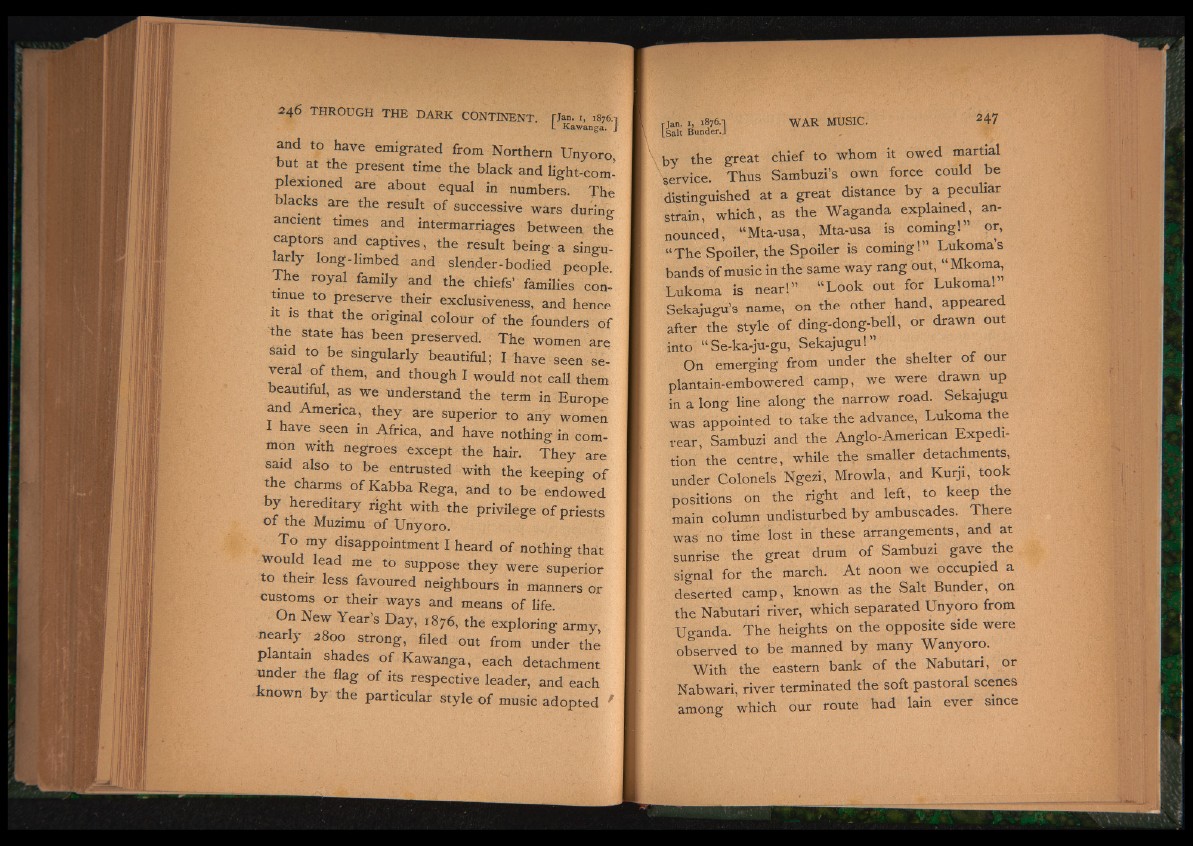
and to have emigrated from Northern Unyoro
but at the present time the black and light-com-
plexioned are about equal in numbers. The
blacks are the result o f successive wars during
ancient times and intermarriages between the
captors and captives, the result being a singula
rly long-limbed and slender-bodied people
The royal family and the chiefs’ families continue
to preserve their exclusiveness, and hence
it is that the original colour o f the founders o f
the state has been preserved. The women are
said to be singularly beautiful; I have seen several
;o f them, and though I would not call them
beautiful, as we understand the term in Europe
and America, they are superior to any women
have seen in Africa, and have nothing in common
with negroes except the hair. T h e y are
said also to be entrusted with the keeping o f
the charms o fK a b b aR e g a , and to be endowed
b y hereduary right with the privilege o f priests
o f the Muzimu o f Unyoro.
T o my disappointment I heard o f nothing that
would lead me to suppose th ey were superior
to their less favoured neighbours in manners or
customs or their ways and means o f life
On New Y e a r ’s Day, 1876, the exploring army,
nearly 2800 strong, filed out from under the
plantain shades o f Kawanga, each detachment
under the flag o f its respective leader, and each
own b y the particular style o f music adopted *
r jan. I, 1876.-1 W A R M U S IC . 247
LSalt Bunder.J
b y the great chief to whom it owed martial
Service. Thus Sambuzi’s own force could be
distinguished at a great distance b y a peculiar
strain, which, as the Waganda explained, announced,
“ Mta-usa, Mta-usa is coming!" or,
11 The Spoiler, the Spoiler is coming!” Lukoma’s
bands of music in the same w a y rang out, “ Mkoma,
Lukoma is near!” “ L o o k out for Lukoma!
Sekajugu’s name, on the other hand, appeare
after the Style o f ding-dong-bell, or drawn out
into “ Se-ka-ju-gu, Sek aju gu!”
On emerging from under the shelter o f our
plantain-embowered camp, w e were drawn up
in a long line along the narrow road. Sekajugu
was appointed to take the advance, Lukoma the
rear, Sambuzi and the Anglo-American Exp ed ition
the centre, while the smaller detachments,
under Colonels Ngezi, Mrowla, and Kurji, to ok
positions on the right and left, to keep the
main column undisturbed b y ambuscades. There
was no time lost in these arrangements, and at
sunrise the great drum o f Sambuzi gave the
signal for the march. A t noon we occupied a
deserted camp, known as the Salt Bunder, on
the Nabutari river, which separated Unyoro from
Uganda. The heights on the opposite side were
observed to be manned b y many Wanyoro.
With the eastern bank o f the Nabutari, or
Nabwari, river terminated the soft pastoral scenes
among which our route had lain ever since